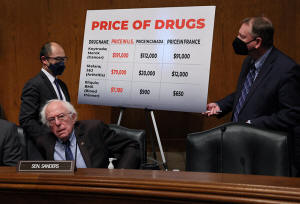US Senate Democrats grill pharma CEOs on drug prices
 Send a link to a friend
Send a link to a friend
 [February 09, 2024]
By Ahmed Aboulenein [February 09, 2024]
By Ahmed Aboulenein
WASHINGTON (Reuters) - U.S. Senate Democrats grilled three top
pharmaceutical executives over the high cost of prescription drugs on
Thursday but failed to extract any commitments from them to lower
prices.
Bristol Myers Squibb CEO Chris Boerner, Merck CEO Robert Davis, and
Johnson & Johnson CEO Joaquin Duato appeared before the Senate Committee
on Health, Education, Labor, and Pensions (HELP), with Davis and Duato
only agreeing to do so last week in response to a subpoena threat.
During the hearing, presided over by HELP Committee Chairman Senator
Bernie Sanders, the three executives declined to commit to lowering
their U.S. prices to match what they charge in other countries like
Canada.
"In Canada, medicines are generally made less available, and it takes
oftentimes considerably longer for those medicines to be available on
average," Boerner said.
Countries like Canada and Japan, where drug prices are lower, have
higher life expectancies than in the United States in spite of this
reduced access, Sanders countered.
The CEOs acknowledged that they still make profits in countries where
they charge far less for their products than they do in the United
States.
The hearing comes as President Joe Biden's administration implements the
first drug price negotiation program for the government's Medicare
health plan for those age 65 and older under the Inflation Reduction
Act. Negotiations started this year on the first 10 prescription drugs
selected for prices that will not take effect until 2026.
The pharmaceutical industry lobbied hard against the provision and
several major companies, including Bristol Myers, Merck, and J&J, sued
the government over it after its passage.

[to top of second column]
|

U.S. Senator Bernie Sanders (D-VT), Chair of the U.S. Senate
Committee on Health, Education, Labor and Pensions, arrives to his
seat to host a hearing about high drug prices featuring Johnson &
Johnson CEO Joaquin Duato, Merck CEO Robert Davis, and Bristol Myers
Squibb CEO Chris Boerner on Capitol Hill in Washington, U.S.,
February 8, 2024. REUTERS/Leah Millis
 The executives blamed higher prices
on pharmacy benefit managers (PBMs), middlemen who negotiate payment
for prescription medicines with drugmakers on behalf of their
employer and health insurer clients.
Sanders said the three companies made billions of dollars in profits
and spent massive chunks of it on stock buybacks and dividends, far
more than what they spent on research and development
"Not a single dollar of this revenue is going to PBMs," he said.
PBMs have come under scrutiny, with the Federal Trade Commission
(FTC) investigating their role in rising healthcare costs and
lawmakers proposing several bills that would require them to make
their fee structures public.
The industry has spent over $8.5 billion over the past 25 years on
lobbying both Democrats and Republicans, Sanders said, and more than
$745 million on campaign contributions.
A Reuters tally found that PBMs ramped up their lobbying spending in
2023, but still shelled not quite half of what the pharmaceutical
industry spent.
(Reporting by Ahmed Aboulenein; Editing by Caroline Humer and Bill
Berkrot)
[© 2024 Thomson Reuters. All rights reserved.]This material may not be published,
broadcast, rewritten or redistributed.
Thompson Reuters is solely responsible for this content. |